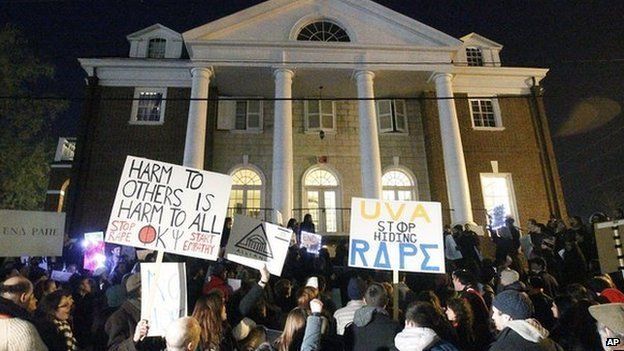Rolling Stone to face false campus rape article lawsuit
- Published

Three members of a University of Virginia fraternity profiled in a debunked Rolling Stone article about gang rape are suing the magazine.
A lawyer for George Elias IV, Ross Fowler and Stephen Hadford said the men had suffered "vicious and hurtful" attacks because of the false piece.
The graduates filed a defamation suit in New York on Wednesday.
Sabrina Rubin Erdely's 2014 article was widely shared online, and the author is also being sued by the claimants.
The lawsuit states that the three men, who had been members of the Phi Kappa Psi fraternity before graduating in 2013, were identified by people who knew them because of details provided in the now-debunked piece.
Rolling Stone apologised in December for what it called "discrepancies" in Rubin Erdely's story, entitled "A Rape on Campus", which was published the previous month.
News of the lawsuit came as the magazine's managing editor, Will Dana - who helped to edit the original article and published an apology online after the story had unravelled - announced he was resigning.
A spokeswoman for the magazine's publisher, Jann Wenner, which is also being sued by the three men, said "many factors go into a decision like this" when asked if Dana's resignation was connected to the now-retracted piece.
'Devastating effect'
The lawsuit states that, "upon release of the article, family friends, acquaintances, co-workers and reporters easily matched (George Elias IV) as one of the alleged attackers and, among other things, interrogated him, humiliated him, and scolded him".
The men are suing on three counts, including defamation and negligent infliction of emotional distress, and all are seeking at least $75,000 (£48,000) for each count.
A lawyer for the plaintiffs said the false claims made in the story "had a devastating effect" on their reputations.
Alan L Frank said the men had been named online by anonymous users after the article came out, and that their "names will forever be associated with the alleged gang rape".
The story centred around the testimony of an unnamed female student referred to as "Jackie", who claimed to have been gang raped at a party held at the fraternity's house.
Following its publication, protests were held outside the Phi Kappa Psi house, and the three men behind the lawsuit say the fallout prevented them from focusing on their studies.
An investigation by the Charlottesville Police Department found no evidence that Jackie had been gang raped.
Rolling Stone commissioned a report from the Columbia Graduate School of Journalism earlier this year, which found numerous flaws at every level of the magazine's editing process.
An associate dean from the University of Virginia, Nicole Eramo, separately sued the magazine for more than $7.5m (£4.8m) earlier this year, saying the story had cast her as the "chief villain".
The piece claimed Eramo had tried to persuade Jackie not to report the alleged rape.
- Published11 December 2014
- Published24 November 2014
- Published6 April 2015
- Published6 April 2015
- Published5 December 2014